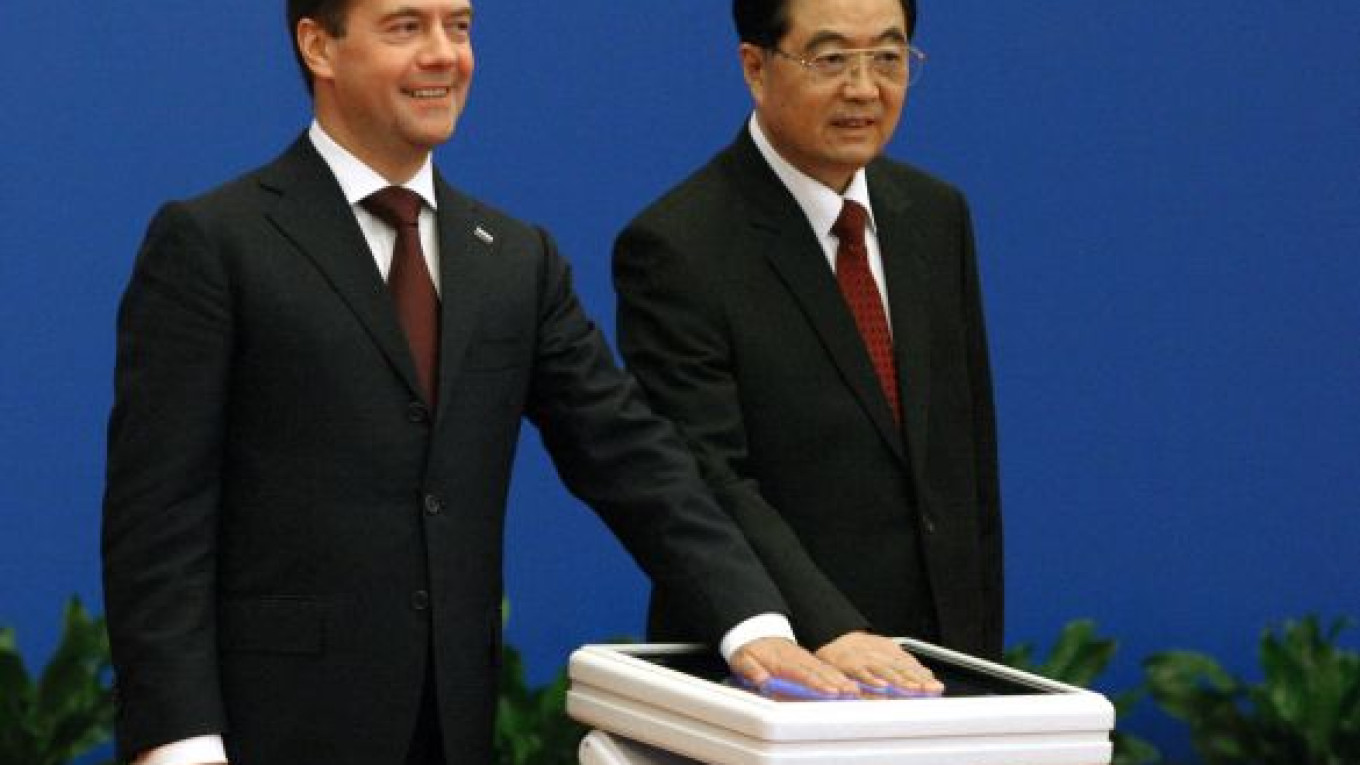President Dmitry Medvedev and Chinese President Hu Jintao opened an oil line connecting the two countries Monday, as they met for the fifth time in the past year in a push to increase bilateral trade.
Economic issues dominated in the leaders' talks, which Hu called "a new start" in Russian-Chinese cooperation.
Medvedev and Hu ceremonially pressed the start button on the Skovorodino-Daqing oil pipeline, built by Transneft and China National Petroleum Corporation as an extension of the West Siberia-Pacific Ocean pipeline.
Transneft and Rosneft, the Russian oil industry champion, received $25 billion in credits from China in exchange for 15 million metric tons of oil per year to flow through the pipeline from 2011 to 2030.
China has requested that Russia increase its oil deliveries to 30 million tons per year. Transneft president Sergei Tokarev said, however, that Russia didn't produce enough oil in East Siberia to meet that kind of demand.
China imported 204 million tons of oil last year, including 9 million tons from Rosneft.
In another oil-related deal, Deputy Prime Minister Igor Sechin last week attended the groundbreaking for a $5 billion oil refinery being built by Rosneft and CNPC, the state hydrocarbon giant, in Tianjin.
Medvedev said Monday that he was pleased that last year's negative, crisis-driven trends in trade had been turned around.
“In all likelihood, we will see trade numbers at a pre-crisis level," the Russian president said after the talks, which were closed to the press.
The numbers got a particular boost from the thick package of energy agreements that were signed. In addition to oil, China, the world's largest energy consumer, will see a new influx of other energy resources from Russia.
"There are practically no limits to the growth of gas consumption in China," Sechin told reporters in Beijing. "The Russian Federation has enough gas for the development of the Chinese economy."
Gazprom and CNPC reached an agreement on the delivery of 30 billion cubic meters of Russian natural gas per year to China for a span of 30 years.
The price for the gas will be set in contracts to be signed next year, and deliveries will begin in 2015, Russian Energy Minister Sergei Shmatko stated.
Rosatom chief Sergei Kiriyenko signed an agreement on the construction of two more 1,060-megawatt units at the Tianwan nuclear generator outside Shanghai. Work on the units, which will supplement two Russian-built plants that came online in 2007, is expected to begin next year. ?
The China Huadin Corporation reached a $5 billion agreement with electricity generating company TGK-2 in Yaroslavl for the construction of a high-efficiency steam generator with a capacity of 440 megawatts to 490 megawatts in that Russian city.
The Russian Energy Ministry and Chinese State Energy Grid created a road map for cooperation in the coal-mining industry. China's energy is now mainly supplied from coal.
Against this background of consumption increase, the Energy Ministry and Chinese National Development and Reform Commission signed a memorandum on energy efficiency and renewable energy sources.
The Federal Fisheries Agency and Chinese Agriculture Ministry signed a memorandum on combating illegal fishing.
The Chinese FAW Group will form a joint venture with Russian GAZ to build trucks in Russia. Aluminum producer RusAl signed a letter of intent with Chinese NORINCO, and VTB bank opened a credit line with the Industrial and Commercial Bank of China.
Political issues did not go completely without attention.
"China and Russia will maintain international peace and stability," Hu promised after the talks.
The nations' presidents were expected to discuss Iran and North Korea in addition to economics.
Russian Foreign Minister Sergei Lavrov signed an agreement with his Chinese counterpart Yang Jiechi on combating terrorism, extremism and separatism.
Medvedev's China trip began Sunday in the northern city of Dalian, where he attended events related to the 65th anniversary of the end of World War II. Those included visits with students and veterans and the laying of a wreath at the newly restored memorial to the Soviet troops who freed the region from Japanese occupation in 1945.
The Russian president also met with Chinese Prime Minister Wen Jiabao and Chairman of the Standing Committee of the Chinese National People’s Congress Wu Bangguo on Monday. On Tuesday, Medvedev travels to Shanghai, where he will attend the Expo 2010 international exhibition.
A Message from The Moscow Times:
Dear readers,
We are facing unprecedented challenges. Russia's Prosecutor General's Office has designated The Moscow Times as an "undesirable" organization, criminalizing our work and putting our staff at risk of prosecution. This follows our earlier unjust labeling as a "foreign agent."
These actions are direct attempts to silence independent journalism in Russia. The authorities claim our work "discredits the decisions of the Russian leadership." We see things differently: we strive to provide accurate, unbiased reporting on Russia.
We, the journalists of The Moscow Times, refuse to be silenced. But to continue our work, we need your help.
Your support, no matter how small, makes a world of difference. If you can, please support us monthly starting from just $2. It's quick to set up, and every contribution makes a significant impact.
By supporting The Moscow Times, you're defending open, independent journalism in the face of repression. Thank you for standing with us.
Remind me later.


